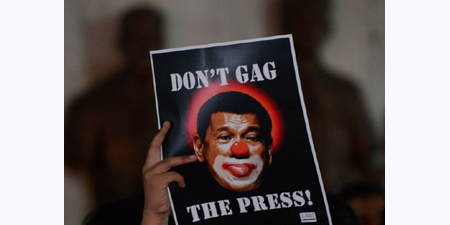Journalist banned from Presidential Palace in Philippines
JournalismPakistan.com | Published: 21 February 2018
Join our WhatsApp channel
President Duterte has banned journalist Pia Randa from the Presidential Palace, leading to widespread condemnation from press organizations. This unprecedented action raises serious concerns regarding press freedom in the Philippines.Summary
The International Federation of Journalists (IFJ) and its affiliate the National Union of Journalists of the Philippines (NUJP) have condemned the decision by President Duterte to ban a journalist from the Presidential Palace. The IFJ and NUJP called for the ban to be withdrawn.
On Tuesday, February 20, Rappler journalist Pia Randa received a text message from senior Malacanang official, Jhopee Avancena, which said that President Duterte has ordered her to be kept out of the Malacanang, the Philippines Presidential Palace. The ban means that Randa, who had been covering the presidential beat for a number of years and is a member of the Malacanang press corps, cannot enter the executive office at the Palace. No clear reasons have been given to justify the ban.
Randa is known to ask tough questions during press briefings, and in more recent times has become the target of presidential anger. Randa has been harassed and vilified online by Duterte supporters.
The ban against Randa came just days after Special Assistant to President Christopher “Bong” Go accused Rappler and Philippine Daily Inquirer of publishing ‘fake news’ during a Senate hearing on a frigate deal. In January, the Philippine Securities and Exchange Commission (SEC) ordered to revoke Rappler’s operating license over allegations that Rappler had received investment funds from the international investor Omidyar Network, that it also gave the investors control over the media company, in violation of the Constitution. Rappler denied the allegation, calling it part of the government’s campaign to silence it, and is appealing the SEC ruling.
This is the first case of a journalist been denied access to Malacanang Palace since the dictatorship of President Marcos which ended in 1986.
NUJP acting chair, Jocelyn Clemente, said: “Shame on President Rodrigo Duterte for displaying extreme pettiness in ordering Rappler reporter Pia Ranada banned from entering Malacañang Palace. When the highest official in the land chooses to wage a personal vendetta against an individual, whether a journalist or a media outfit, it sends a clear and chilling signal that everyone else better report only what he wants you to or else. We call on all colleagues to unite and reject this outrage and to continue resisting all attempts to dictate what we can and should report. We owe this to our profession, we owe this to the people, we owe this to the nation.”
The IFJ said: “We stand in solidarity with our colleagues in the Philippines in condemning the latest decision by President Duterte to ban entry to the Presidential Palace for a journalist. The fact that this is the first time a journalist has been banned since 1986 raises serious questions about the future of press freedom in the Philippines, which remains one of the most dangerous countries in the world for journalists.” – IFJ media release/Photo: AFP
KEY POINTS:
- Pia Randa, a Rappler journalist, is banned from the Presidential Palace.
- The ban reflects ongoing tensions between the Duterte administration and the media.
- This is the first journalist ban from Malacanang since 1986.
- The ban follows accusations of 'fake news' against Rappler by government officials.
- The International Federation of Journalists condemns the ban and supports Randa.
























